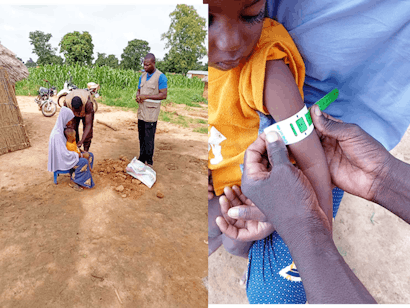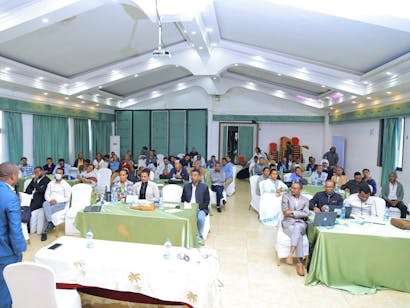Advancing Nutrition Through Community-Led System Change
The Tooro region, despite being part of Uganda’s “food basket,” continues to experience persistently high rates of malnutrition. While stunting has declined from 45.6% in 2011 to 38.7% in 2022, it remains well above the national average of 26% (UDHS 2022). In Kibasi Town Council, Burahya Subcounty, Kabarole District, home to over 12,000 residents, malnutrition is compounded by gaps in water access, health infrastructure, and weak coordination among nutrition stakeholders.
Activating Citizens Through the Community Scorecard
In 2024, the CASCADE program introduced the Community Scorecard (CSC) approach in Kabarole to enhance accountability in public service delivery. A key turning point was the scorecard interface meeting in Kibasi, where 70 residents—34 women and 36 men—engaged with CASCADE’s local partner, Tooro Cultural Research and Development (TCRD), to identify and prioritize service delivery gaps.
“We realized we couldn’t just wait for solutions to come from outside,” said Jemima, a Village Health Team (VHT) coordinator. “We had to be part of the change ourselves.”
Identifying Systemic Barriers to Nutrition
The discussions revealed deep-rooted governance and coordination challenges, including:
- Weak nutrition partnerships and planning
- Inadequate financing and poor resource tracking
- Limited institutional capacity for nutrition scale-up
- Fragmented policy implementation
- Insufficient data and evidence for decision making
- Weak advocacy and communication structures
These were recognized not just as programmatic issues but as systemic failures requiring structured civic response and policy influence.
From Dialogue to Collective Action
To ensure follow-through, the community elected a 10-member CSC Committee composed of citizens, duty bearers, and service providers. The committee’s action plan addressed water, education, youth engagement, and local governance:
- Mobilizing resources to repair boreholes
- Forming water user committees
- Mainstreaming nutrition into farmer field schools and school clubs
- Creating youth-led initiatives and demonstration sites
- Advocating for the upgrade of Kijuura Health Centre III
- Establishing financing systems for water source maintenance
From Local Solutions to Systemic Impact
One of the community’s major achievements was securing private sector support to establish a new water source. In parallel, community members introduced household maintenance contributions and bylaws to safeguard water infrastructure. For example, Hakibale Cell set up a water user committee and agreed on structured payments to maintain the boreholes.
By the time of the follow-up CSC dialogue, community participation had more than doubled to 170 people. Members had raised Ugx 470,000 (approx. EUR 111) to repair the Mironge and Bulera boreholes. This marked a shift from one-off interventions to institutionalized governance and shared accountability.

The community also linked water access directly to improved nutrition outcomes, emphasizing how clean water reduces diarrheal disease, supports food hygiene, reduces caregiving burdens, and enhances agricultural production. These interlinkages reinforce the need for integrated, cross-sectoral action to address malnutrition.
Kibasi’s experience demonstrates how community scorecards can spark sustained civic engagement, attract partnerships, and drive systems-level change. What started as a feedback tool has evolved into a platform for coordinated advocacy and accountable service delivery.
Author
Desire Oyenyboth
CASCADE Nutrition Hub Manager – Tooro Subregion.© 2025



